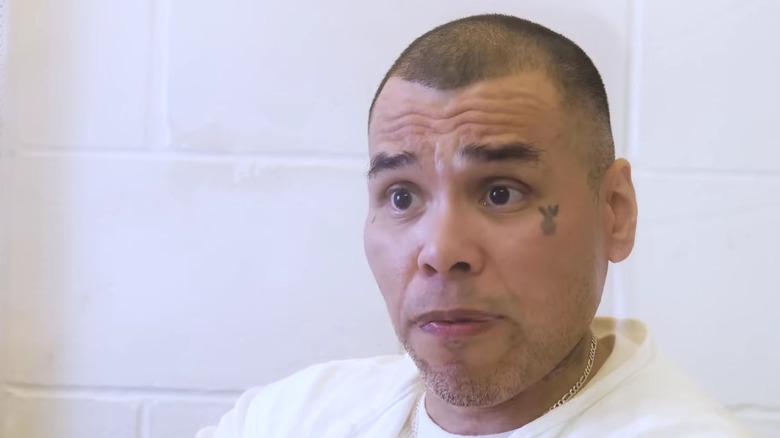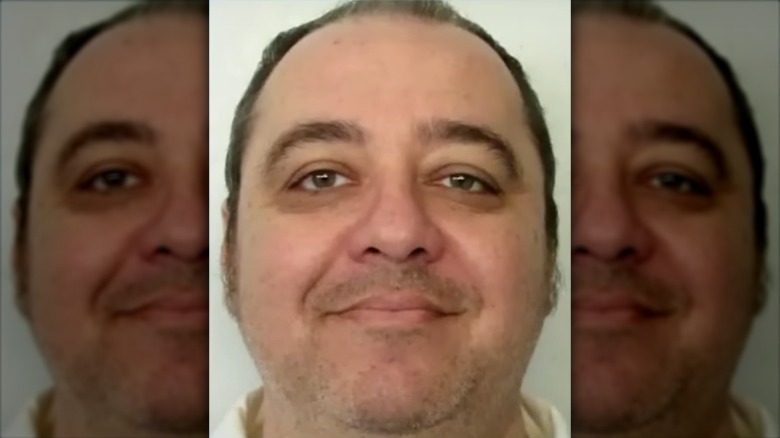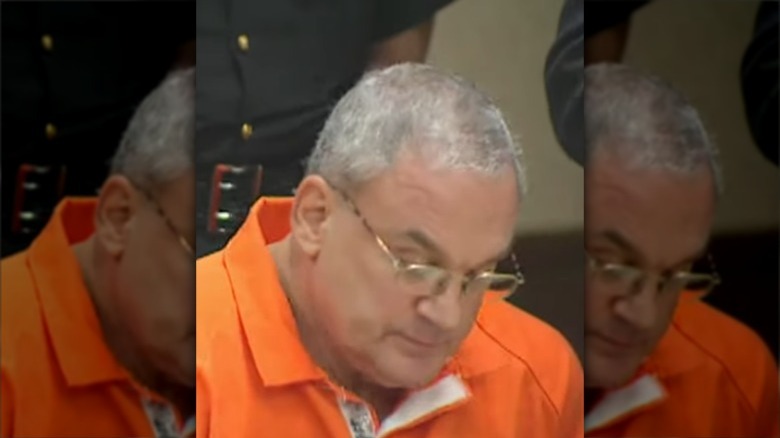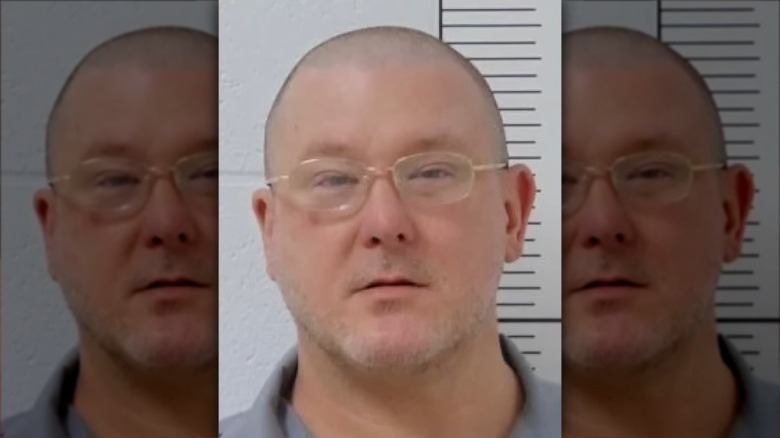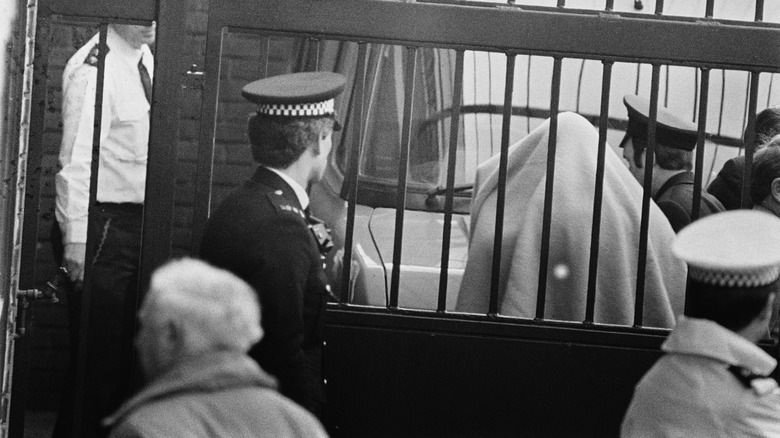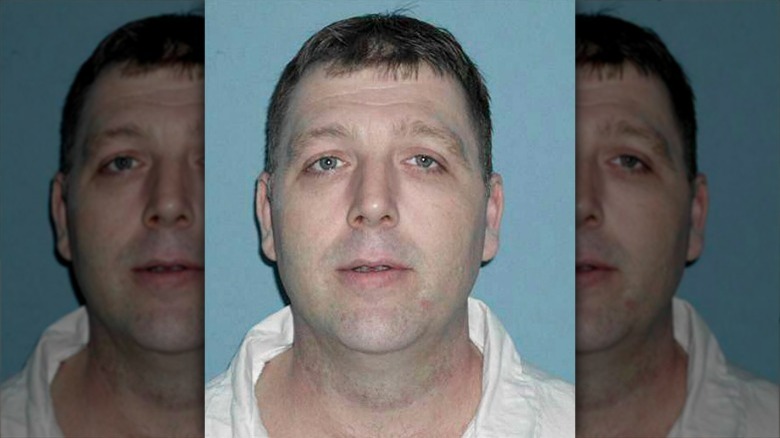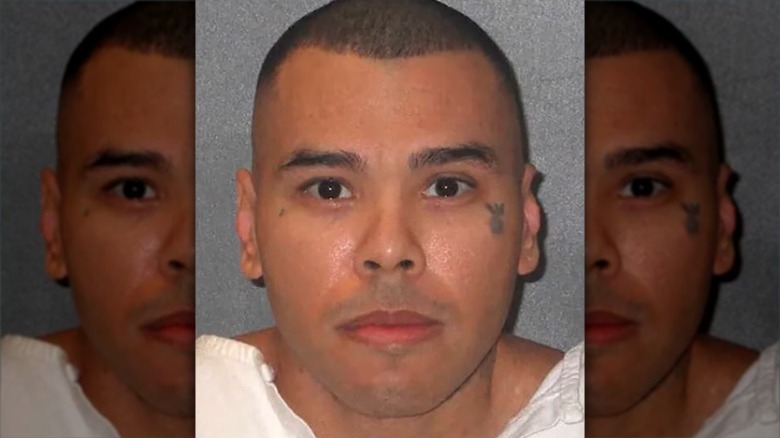Infamous People Who Died In 2024 And No One Noticed
Every year comes with its fair share of famous deaths (some of them even chillingly connected to other celebrities). Of course, at the end of the year, there's always the list of celebrities, movie stars, artists, and the like who have died — people whose deaths are extensively covered. Then there are particularly infamous deaths also making just as many headlines: O.J. Simpson dying at 76 in April 2024, for example, who was the center of the "Trial of the Century," when he was accused — then eventually acquitted — of the murder of his ex-wife Nicole Brown Simpson and her friend. At the same time, though, there's the opposite end of the spectrum, where both once famous — and infamous — people die without fanfare.
Not all infamous people get the same sort of news coverage that someone like Simpson did upon their death. Rather, there are more than a few criminals and murderers whose deaths come and go with little more than a passing mention by news outlets. And some of them even carried a level of controversy with them into their deaths. Here are a handful of the infamous deaths of 2024 that you might not have heard of.
Kenneth Eugene Smith
The events faced by Kenneth Eugene Smith on the road to his January 2024 execution are a convoluted one. Smith's capital crime was the 1988 murder of Elizabeth Sennett, for which he'd been hired by Sennett's husband, a broke preacher looking for an insurance payout. Smith and another hitman staged the scene to look like a break-in that turned violent, ending with Sennett being stabbed in the neck and chest. Smith's execution was planned for 2022.
But as it turns out, the state of Alabama has a history of botched executions. On the day of Smith's planned execution, lawyers were going back and forth regarding a stay of execution for him, but none of those events were communicated to Smith himself. That delay and accompanying confusion also led to him being strapped to a gurney for four hours, stuck with needles as the team failed to insert an IV. The execution was ultimately called off.
Fast forward to January 2024, and Smith's execution was once again on the table, making news for a new reason: He would be the first person executed via nitrogen hypoxia (forcing a person to breathe pure nitrogen). The method itself has stirred controversy regarding whether or not it's actually humane; medical professionals have argued that it might have terrible side effects, and the U.N. has even weighed in, condemning its use altogether. Those present on the day described the sight of Smith's body thrashing about as he died, seeming to support those arguments, though the state of Alabama has claimed that nothing unexpected happened whatsoever.
Pearse McAuley
The whole history between Ireland and the United Kingdom is a pretty complicated and long one, so for now, it's probably best to leave that explanation with the fact that certain groups in Ireland have wanted both unity and independence from the U.K. That particular goal led to the formation of groups like the Irish Republican Army (or IRA, which even attacked U.S. soil once), which became notorious for acts of violence.
That's the background against which Pearse McAuley was operating. McAuley was a member of the IRA and involved in a number of terrorist attacks that the IRA became known for. In 1990, he was part of a conspiracy to murder a British businessman; the authorities connected him to it when they discovered 70 pounds of explosives, all linked to him. That said, he wasn't in jail long, escaping just a year later. But his most notorious crime was the fatal IRA shooting of detective Jerry McCabe in 1996, when he and his gang opened fire on a police car with machine guns — a crime that he was convicted of in 1999, and sentenced to 14 years in jail. McAuley was released in 2009, only to try to kill his wife in 2014, stabbing her 13 times; this time, he was sent to prison for another 12 years (though he was released a few years early, in 2021).
The following years were light on news of McAuley until March 2024, when he was suddenly found dead in his home at age 59, having apparently died of natural causes.
Santiago Omar Riveros
Argentina in the 1970s and 1980s was a scary place, to say the least. The period marked the transition to an oppressive rule by a military junta, which instituted a campaign now known as the Dirty War. Over the course of just seven years, tens of thousands of citizens were disappeared — captured, kidnapped, or killed — by the government. And one of the most infamous figures of the time was General Santiago Omar Riveros, known for running one of the most brutal torture camps of the era, Campo de Mayo.
From his spot there, he oversaw civil rights violations of every kind. Anyone considered a left-leaning political enemy was brutally tortured for information or killed, sometimes by being pushed into the sea, their limbs bound. Bodies were burned or buried en masse, pregnant prisoners were killed shortly after giving birth, children were abducted and given to families associated with the junta, and that just scratches the surface of the crimes Riveros allowed during his time in power. By 1983, the military junta fell apart and was replaced by a new presidency, at which point Riveros and his allies faced a reckoning for what they'd done. Over the next four decades, he faced more and more convictions, earning multiple life sentences — the harshest available punishment.
Nonetheless, Riveros spent recent years trying to overturn his sentence, never with any success and never showing a shred of guilt over his actions. He died while under house arrest in Buenos Aires on March 24, 2024, at the age of 100.
Fred Neulander
Back in 1994, a case was about to captivate both the Philadelphia area and the American Jewish population. In November of that year, 52-year-old Carol Neulander was found brutally beaten to death in her own home, while her husband Rabbi Fred Neulander was working late at the synagogue he had founded. She'd been killed by two hitmen, but the client who'd hired them? It seemed to be the rabbi. As for the reason why, well, that most likely had something to do with Neulander's affair; he'd wanted to more easily carry on his affair with radio broadcaster Elaine Soncini.
Nonetheless, Neulander was allowed four years of freedom before finally being arrested, but even then, his first trial didn't actually result in any punishment. A hung jury meant that it would take until November 2002 — eight years after the actual crime — for Neulander to actually be found guilty on all counts of capitol murder, felony murder, and conspiracy to commit murder.
From there, Neulander's crime reached a very interesting level of fame. Of course, there were books that came out detailing the case — one of which was his own memoir — and documentaries, but there was even a musical staged in Los Angeles in 2022. Despite that level of fame (or infamy), Neulander's death came and went without much fanfare. The 82-year-old inmate was found unresponsive in the prison infirmary on April 17, 2024, and he was pronounced dead that same night.
Brian Dorsey
The story involving Brian Dorsey has become something of a controversial one, but maybe not for the most expected of reasons. Dorsey's story begins in December 2006, when, high on cocaine, he was taken in by his cousin and her husband. The two of them intended to give him some help, but that same night, he took their shotgun, killing both of them in their bed, then stole some of their belongings in order to repay his own debts. It didn't take long for him to turn himself in, though, and after cooperating with officials, he pled guilty in 2008, and was sentenced to death. In April 2024, the death sentence was officially carried out.
But the controversy reared its head between those two points in time. On one hand, there have always been questions about the original case. Insufficient compensation for Dorsey's defense meant that important pieces of information were left out of his original trial, leading to doubts over whether it could be counted as fair. And on the other hand, during the years Dorsey spent behind bars, he was known as nothing less than a model prisoner. He reportedly had the trust and respect of the prison staff, even working as their barber; 70 of them even got together to write a letter to the governor, arguing that, in this specific case, they didn't think the death penalty was appropriate punishment.
Dorsey's attorneys made similar arguments, but both the governor and the U.S. Supreme Court made the controversial decision to uphold the original ruling, allowing the execution to proceed.
Robert Pickton
Most of the time, you'd expect that the death of a serial killer would make pretty big news — even if you might have forgotten that some infamous serial killers are still in prison at all. But when it comes to Robert Pickton, there's probably a chance his name has somewhat flown under the radar in recent years.
As the story goes, back in the late 1990s, Pickton was rather active on his farm, regularly feeding his pigs, but not with anything that you'd expect to give to livestock. Rather, he'd decided to feed his pigs human remains: Pickton lured marginalized women to his Vancouver farm, where he would strangle them and feed their remains to his livestock. Ultimately, investigations at his farm turned up the DNA of 33 different women, though Pickton himself actually bragged about killing upwards of 40 people. In 2007, he was charged with 25 murders and found guilty of six counts of second-degree murder; he was handed a life sentence and has since become known as one of Canada's most notorious serial killers.
There was relatively little to be said about Pickton's life behind bars over the next 17 years, but on May 19, 2024, he was reportedly involved in an assault within Port-Cartier Institution. Another inmate was being held in custody for the incident, and Pickton himself was transferred to a hospital, where he died from his injuries.
Malcolm Fairley
In the mid-1980s, a serial sex attacker nicknamed "The Fox" — real name Malcolm Fairley — was terrorizing England. Fairley reportedly broke into the homes of random, innocent people and proceeded to make himself feel welcome as he waited for them to return, even going so far as to eat their food or sit back and watch some TV. That particular penchant was actually what earned him his nickname, as it was said that he would "build dens" inside of their homes where he could get comfortable. But once the homeowners returned, then the violence would begin, Fairley threatening them with his shotgun, violently attacking — and even, in some cases, raping — his victims.
The country was, understandably, terrified of Fairley, unsure where or how often he would strike. That in turn sent the authorities into a frenzy, working on one of the largest manhunts in the country's history, involving some 200 different officers. The discovery of his car ultimately led investigators to him, at which point he confessed to his crimes — 81 separate offenses, none of which he seemed to show any remorse for, according to the officers who caught and spoke with him. The crime spree landed him with six life sentences in 1985.
As October 2023 rolled around, Fairley was apparently up for — and then quickly refused — parole, with a number of officials voicing their approval, firmly believing that he was still too much of a risk to the public. Any debate didn't last long, though; he died in prison in May 2024, aged 72.
Jamie Mills
The state of Alabama has come under fire on multiple occasions in 2024 alone when it comes to its use of the death penalty. The second of those executions was that of Jamie Mills, killed by lethal injection in May 2024, having been charged with the murder of Floyd and Vera Hill in 2005, along with his wife JoAnn Mills and a drug dealer by the name of Benjie Howe. As reported, the murder weapon was found in the trunk of Jamie and JoAnn Mills' car. JoAnn claimed that the evidence was planted — a claim consistent with other evidence — but when police lied and leveled threats at her family, she implicated her husband.
But that's just the beginning when it comes to questionable legal tactics. During Jamie's trial, prosecutors were wholly dependent on JoAnn's testimony, which she claimed was being made without any plea deals in place. With the jury believing that she had no ulterior motives, they found Jamie guilty and sentenced him to death; a week later, though, JoAnn's trial ended with her being given a far kinder punishment (life with possible parole), despite initially facing the exact same charges as her husband.
That raised plenty of eyebrows, and Jamie's legal team argued that the prosecution had lied about the existence of a plea deal during the trial. JoAnn's lawyer even admitted to working out that exact plea deal, getting her a reduced sentence in exchange for cooperation. Jamie filed to have his case reopened, only to be met with rejections on all fronts.
Ramiro Gonzales
As it turns out, questions of legality can get a little murky when it comes to death row inmates; it certainly did in the case of Ramiro Gonzales, who was imprisoned for the 2001 murder of 18-year-old Bridget Townsend. He had been looking for Townsend's boyfriend, but upon finding he wasn't around, Gonzales headed to their house, robbed it, then kidnapped and killed her. Then the case went cold for 18 months. Investigators only caught up with him when he was in prison for a different crime, at which point he confessed to Townsend's murder. In 2006, five years after the murder, he was convicted and handed the death penalty.
And that's where things get a little confusing. In Texas, jurors can't hand out a death sentence without having reason to think that a defendant will continue to be a danger to society. That caveat was what attorneys tried to argue to the Supreme Court, pointing to the remorse and sense of responsibility he'd shown over the 18 years since his sentencing. According to them, if Gonzales were to be given a chance for true rehabilitation, he wouldn't present any real harm.
But Gonzales' defense team's requests for clemency were denied by the state, which argued that he had, at the time of his sentencing — and prior to his time on death row — given jurors reason to believe he was still dangerous, between the crime he was actually apprehended for and other problems he'd caused in prison. Ultimately, he was executed in June 2024.
Ernesto Weber
Argentina in the 1970s really wasn't the safest place to be. The middle of the country's Dirty War meant that the military government wasn't unaccustomed to violence, something that's pretty clear by the tens of thousands of people who vanished due to their suspected political ties. But it gets even more gruesome when you start looking at the violence perpetuated by policeman Ernesto Weber.
In the late 1970s, Weber was stationed at Argentina's School of Mechanics of the Navy. Which doesn't sound too bad, until you realize that this school was actually functioning as not only a detention center, but also the largest, most secretive, and most effective torture and death camp in the nation. While there, he participated in acts of torture, looting, kidnapping, and theft, as well as the brutal 1977 murder of journalist Rodolfo Walsh. Not only that, but he also had a twisted reputation within the prison, being known either as "The Teacher" or simply the number "220." Both of which related to his longstanding legacy: teaching his peers how to best torture prisoners with a 220-volt cattle prod.
Once the political scene changed, Weber was handed a life sentence — adjusted to house arrest in 2017 — for the crimes against humanity committed while at the prison. (Although he wasn't officially discharged from the police force until 2023, strangely enough.) Seven years later, on July 11, 2024, he died at the age of 92.
If you or anyone you know is dealing with domestic abuse or has been a victim of sexual assault, contact the relevant resources below:
-
The National Domestic Violence Hotline at 1−800−799−7233. You can also find more information, resources, and support at their website.
-
The Rape, Abuse & Incest National Network website or contact RAINN's National Helpline at 1-800-656-HOPE (4673).
